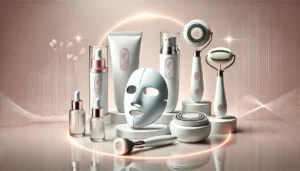Nanotechnology has captured global attention with its potential to revolutionize various industries, and cosmeceutical health science is no exception. While the language and concepts of nanotechnology gained popularity relatively recently, the use of nanoscale materials for cosmetic purposes dates back to ancient times. This article explores the current landscape of nanotechnology innovations in cosmetic science, focusing on its applications, market trends, and novel developments.
Current Market Trends
1. Overview
Nanotechnology’s influence in the cosmetic industry stems from its ability to enhance product efficacy. The global nanotechnology market, valued at $1.76 billion in 2020, is projected to reach $33.63 billion by 2030, reflecting a remarkable CAGR of 36.4% from 2021 to 2030. The cosmetic and personal care sector has witnessed a surge in demand for nanomaterial-based components, particularly for anti-aging treatments utilizing nanocarrier delivery systems.
2. Market Dynamics
Carbon nanotubes, titanium nanoparticles, and silver nanoparticles dominate the nanomaterials market. Nano silver, known for its antibacterial and deodorizing properties, is gaining traction in cosmetics, contributing to an increased market share. Rising demand in countries like India and China further propels the market, with a focus on titanium dioxide and zinc oxide nanoparticles in sun care cosmetics.
3. Industry Players
Leading cosmetic companies such as L’Oreal and L’Core Paris actively incorporate silver nanoparticles in their formulations, nanotechnology innovations in cosmetic science that emphasize continuous research and development to meet evolving consumer demands.
Novel Developments Across the Globe
1. Liposomes
Introduced in the 1960s, liposomes have evolved into a cornerstone of cosmetic formulations. Their biocompatibility, flexibility, and ability to enhance ingredient absorption make them essential in products ranging from sunscreens to deodorants.

2. Nanoemulsions
Transparent and stable, nanoemulsions play a pivotal role in cosmetic formulations due to their low viscosity and large interfacial area. Their versatility extends to various products, including skin lotions, deodorants, and hair serums.

3. Nanocapsules
L’Oréal’s Plentitude Revitalift, introduced in 1988, marked the advent of nanocapsules. These polymeric capsules enhance the stability, penetration, and controlled release of active ingredients in cosmetics.

4. Solid Lipid Nanoparticles (SLN)
Primordial lipid-based nanoparticles, SLNs offer enhanced penetration and protection for cosmetic components. Their applications span from physical sunscreens to perfumes and insect repellants.

5. Nanocrystals
Pure drug particles stabilized by surfactants or polymers, nanocrystals significantly improve bioavailability and solubility, with applications in skincare formulations for photoprotection.
6. Nanogold
Known for antioxidant and anti-aging properties, nanogold finds applications in deodorants, face packs, and anti-aging creams. Its inert and biocompatible nature makes it a sought-after ingredient in the cosmetic industry.

7. Dendrimers
Highly defined macromolecules with functional groups, dendrimers enhance active substance delivery. Their controlled release properties make them valuable in skin, nail, and hair care products.

8. Fullerene
Soccer-ball-shaped clusters of hollow carbon atoms, fullerenes boost antioxidant capacity, protect against UV damage, and have gained popularity in anti-aging treatments.

9. Carbon Nanotubes (CNT)
Rolled graphene fibers with diverse applications, CNTs show potential in hair coloring and are preferred in hair care products due to their low toxicity and cost-effectiveness.

10. Nanosilver
Widely used for its antibacterial properties, nanosilver is incorporated into various cosmetic products, including soaps, deodorants, and face creams, showcasing its versatility in skincare formulations.
In conclusion, nanotechnology innovations in cosmetic science continue to shape the future of cosmeceutical health science, offering innovative solutions that enhance product performance and meet evolving consumer preferences. As research and development in this field progress, the cosmetic industry can anticipate even more groundbreaking advancements in the years to come.
Did you enjoy this article, read about Skincare Devices: How AI Revolutionized our Beauty Treatment




